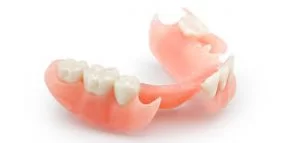Remove and rinse dentures after eating. Run water over your dentures to remove food debris and other loose particles. We would advise placing a towel on the counter or in the sink, or ensure there is water in the sink, so the dentures won’t break if you drop them.
It is very important to brush your dentures twice a day, as you would your natural teeth. Soak and brush them with a soft-bristled brush and non-abrasive denture cleanser to remove food, plaque and other deposits. If you use denture adhesive, make sure you clean all the grooves.
Soak dentures overnight. Most types of dentures need to stay moist to keep their shape. Place the dentures in water or a mild denture-soaking solution overnight. Follow the manufacturer’s instructions on cleaning and soaking solutions.
Rinse dentures thoroughly before putting them back in your mouth, especially if using a denture-soaking solution.
Clean your mouth after removing your dentures. Use a soft-bristled toothbrush on natural teeth and gauze or a soft toothbrush to clean your tongue, cheeks and roof of your mouth (palate). If used, remove any remaining denture adhesive from your gums.
It is very important to treat your dentures like you would treat your natural teeth. You should keep them as clean as possible to prevent inflamed gums, bacterial/fungal infection and to improve the longevity of any teeth you may have.
Additional benefits include avoiding bad breath and staining of the acrylic.
We would advise avoiding the following products to clean your dentures:
• Abrasive cleaning materials. Avoid stiff-bristled brushes, strong cleansers and harsh toothpaste, as these are too abrasive and can damage your dentures.
• Whitening toothpastes. Toothpastes advertised as whitening pastes often contain peroxide, which does little to change the colour of denture teeth.
• Bleach-containing products. Do not use any bleaching products because these can weaken dentures and change their colour. Do not soak dentures with metal attachments in solutions that contain chlorine because it can tarnish and corrode the metal.
• Hot water. Avoid hot or boiling water that could warp your dentures.
You can wear your dentures at night, but we prefer that they be removed to give your gums and bone a chance to relax from the pressure of wearing the denture all day.
It is also important to know that pneumonia-causing bacteria can be moved from the mouth to the lungs by breathing. Dentures that are not removed at night can become breeding grounds for bacteria and fungi (such as yeast). That is what makes them potentially dangerous. Removing them also gives you the chance to clean and soak them overnight as previously mentioned.
Just because you know how to clean your dentures well at home, it is still important to have regular checks with your dentist and hygienist. You hygienist can remove calcified plaque build-up on the teeth and denture, that you cannot remove with a toothbrush. Also check the inside of your mouth to make sure it is healthy and carry out a cancer screening.
See the dentist if your dentures become loose as this can cause irritation, sores and infection. Our dentist here at The Denture & Implant Clinic can also assess the acrylic border or stained teeth, and if need be, refer you to the in-house dental technician, who can replace with fresh acrylic or new teeth in the lab, whilst you wait.

We are proud to help our valued patients to transform their smiles through a wide choice of general and cosmetic dental treatments.
Our TreatmentsWe ensure an exceptional patient journey – from start to finish.
learn moreDelivering life-changing smiles and ensuring excellent dental health.
learn moreDental implants and us – together we can recreate a naturally beautiful smile.
learn more